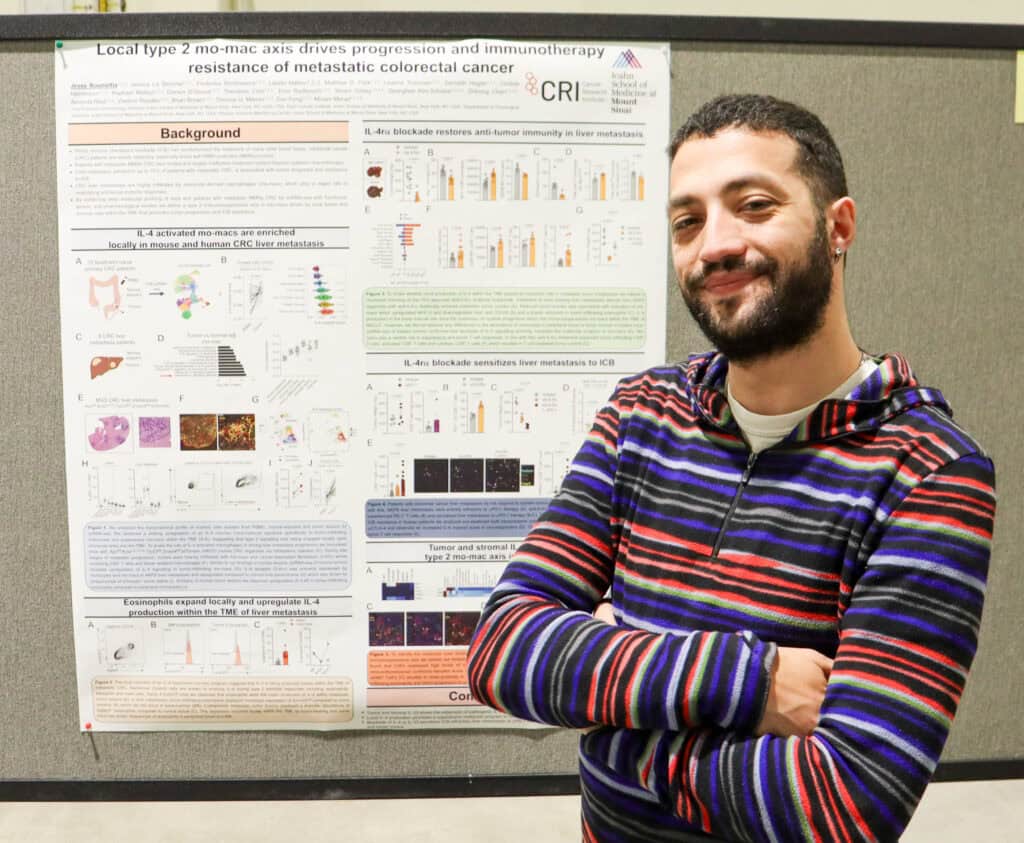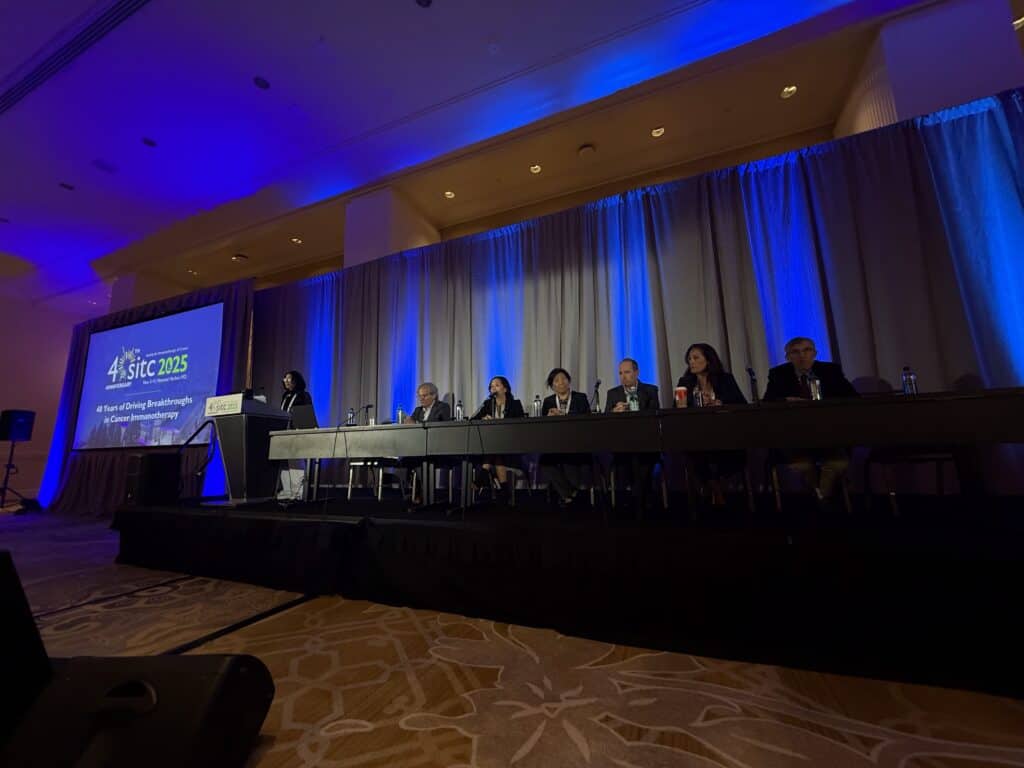The 40th Annual Meeting of the Society for Immunotherapy of Cancer (SITC) marked a milestone celebration of four decades of progress in cancer immunotherapy, bringing together many of the field’s brightest minds and innovators. Held November 7–9, 2025, at the Gaylord National Resort and Convention Center in National Harbor, MD, SITC 2025 was buzzing with energy, collaboration, and discovery.
What began forty years ago as an emerging exploration of tumor immunology has transformed into a global movement that cannot be ignored, driving lifesaving therapies. Today, SITC continues to unite early-career investigators and established experts to push the boundaries of immuno-oncology and accelerate breakthroughs that change patient outcomes.
Among the informational keynotes, lively discussions, and meaningful connections, several key themes emerged – including neuroimmunology, immunometabolism, the future of cellular therapies, and cancer prevention – harbingers of where the next wave of cancer immunotherapy is headed.
Friday Recap
Keynote Speaker
SITC 2025 began on Friday, Nov. 7, with the Presidential Welcome and Awards Ceremonies, followed by the keynote lecture by Jennifer Wargo, MD, MMSc. Dr. Wargo spoke about the relationship between cancer and the microbiome, highlighting the impact that certain factors, such as diet, have on gut microbes and potentially on responses to immunotherapy. Using various technologies, Dr. Wargo emphasized that understanding and targeting microbes may help prevent cancer, impact response to therapy, and improve overall immunity, particularly in younger people.
Friday Voices of CRI
Among the lively conversations and engaged exhibit floor, CRI-affiliated scientists presented groundbreaking work in cancer immunotherapy.
During his talk, current Scientific Advisory Council member Ulrich von Andrian, MD, PhD, revealed how pain-sensing neurons do far more than signal discomfort—they actively shape immune responses. In inflammatory diseases like psoriasis, these neurons send local signals and release molecules that drive pro-inflammatory activity, while in cancer, they build an immunosuppressive shield: sensory fibers grow into tumors and influence incoming immune cells in a way that forms a barrier blocking T-cell attacks on tumors. Remarkably, disrupting these sensory-neuron signals in cancer models restored immune infiltration and tumor rejection, uncovering a powerful—and unexpected—link between nerve signaling, inflammation, and cancer immunity.
University of Pittsburgh’s Olivera Finn, PhD, recipient of the 2017 AACR-CRI Lloyd J. Old Award in Cancer Immunology, gave a talk on cancer prevention, highlighting the MUC1 peptide vaccine and the feasibility of testing cancer vaccines. By targeting the hypoglycosylated, tumor-associated form of MUC1, the vaccine triggers stronger immune responses in premalignant settings than in advanced cancers. Immune responders showed a marked drop in adenoma recurrence, highlighting the power of early intervention. Meanwhile, high levels of myeloid-derived suppressor cells may be indicative of patients less likely to respond, paving the way for personalized, preventive immunotherapy that may reduce cancer risk.
“We can learn from immunotherapy about the ways we could use the immune system to prevent cancer in people at high risk.”
– Olivera Finn, PhD
Other scientific talks on Friday focused on additional neuroimmunology topics such as GABA signaling, the role of serotonin in tumors, neuroimmune drivers of cancer inflammation, and other neurosignaling pathways implicated in cancer development and immunotherapy responses.
CRI’s Clinical Innovator Bilal Siddiqui, MD, echoed these topics when asked about what he is most excited about in the field: “I’ve been really excited about neuroimmunology; I think it’s going to be a new and burgeoning field.”
From Sessions to Socials
After the main conference sessions wrapped on Friday, CRI hosted an intimate social happy hour just steps from the convention center, bringing together current, former, and prospective CRI-funded scientists for an evening of connection and inspiration.

Click through to see photos from CRI’s Happy Hour at SITC25.
Guests had the chance to mingle with CRI’s CEO, Alicia Zhou, PhD, as well as the opportunity to share stories, insights, and enthusiasm for the ever-evolving field of cancer immunotherapy.
Over light fare, cold brews, and even a couple of signature cocktails, the conversations flowed easily—from discussing the latest breakthroughs presented at SITC to exploring new ideas for collaboration and mentorship. The atmosphere reflected the same spirit that drives CRI’s mission: community, curiosity, and a shared commitment to advancing lifesaving immunotherapy research.
Saturday Recap
Smalley Lecture
SITC’s celebration of breakthroughs continued on Saturday, starting with the prestigious Richard V. Smalley Memorial Award & Lectureship. This award honored Ira Mellman, PhD, President of Research at the Parker Institute for Cancer Immunotherapy (PICI), former CRI-funded scientist, and current member of CRI’s Scientific Advisory Council.
In his lecture, “The Coming Renaissance of Cancer Immunotherapy,” Dr. Mellman reflected on the remarkable transformation the field has undergone over the past twelve years—an era marked by groundbreaking therapies and patient impact once thought unimaginable. The cancer immunity cycle, first described by Dr. Mellman and Dan Chen, MD, PhD, in 2013, has become a widely used framework for conceptualizing how antitumor immunity operates. While early checkpoint inhibitors transformed oncology, they benefit only a subset of patients, highlighting the need for new approaches across inflamed, excluded, and immune-desert tumors.
Recent work is uncovering deeper biology and driving innovations like personalized mRNA vaccines, which have already shown encouraging immune responses in pancreatic cancer. With emerging platforms spanning bispecific engagers, engineered TCRs, TILs, and next-generation CAR T cells, the field is now pushing toward more individualized, scalable immunotherapy.
Dr. Mellman’s message was both celebratory and forward-looking in tone: a reminder that while cancer immunotherapy has achieved extraordinary milestones, our collective greatest potential is still ahead.
Saturday Voices of CRI
CRI-affiliated scientists continued to showcase their work at SITC on Saturday.
Current CRI Irvington Fellow Jesse Boumelha, PhD, of the Icahn School of Medicine at Mount Sinai, presented compelling findings that shed light on a key pathway driving the immunosuppressive phenotype of monocyte-derived macrophages in certain difficult-to-treat colorectal cancers with liver metastases.
His research, under the guidance of Scientific Advisory Council member Miriam Merad, MD, PhD, revealed that targeting this pathway with an anti–IL-4 monoclonal antibody—a therapy originally developed for allergic inflammation—can reinvigorate anti-tumor immune responses.

Building on these promising preclinical results, an early-phase clinical trial has now been launched to evaluate the therapeutic potential of this blockade in patients:
“Already, we’re at the point where we are now accruing patients for a clinical trial based on the work that we’ve been carrying out in the last two years. We will know very quickly whether this is an approach that may have benefit for these patients.”
– Jesse Boumelha, PhD
Greg Delgoffe, PhD, of UPMC Hillman Cancer Center and a 2020 CRI Lloyd J. Old STAR, gave an insightful talk on T cell metabolism, revealing that standard T cell manufacturing conditions in high-glucose media can unintentionally weaken therapeutic T cells. Under these “feast mode” conditions, T cells lose metabolic flexibility, becoming more prone to exhaustion and less effective against tumors, proving that more isn’t always better. By fine-tuning metabolic conditions during T cell manufacturing, such as optimizing how the cells handle glucose, it may be possible to improve their antitumor activity.
Additional talks on Saturday focused on immunometabolism, including the control of T cell metabolic fitness in cancer, and considerations of leveraging metabolic engineering for CAR T therapy.
The focus on the future of CAR T therapies was echoed by others, with former CRI-funded scientist Brent Hanks, MD, PhD, saying: “There are lots of studies coming out more recently that have really implicated T cell based therapeutics as being a critical next step and the arsenal that we have for managing patients…there’s a lot to be learned about the development of resistance to those therapeutics…very interested and excited about that.”
Facing Uncertainty in Cancer Research Funding
CRI’s CEO Alicia Zhou, PhD, participated in a panel alongside several esteemed colleagues entitled The Momentum and Future of Cancer Research Funding, held during the lunch hour on Saturday. The discussion brought together leaders from major research funding agencies to examine the challenges and opportunities of sustaining progress in cancer research amid federal-level uncertainty, offering candid insights into the evolving funding landscape and its impact on scientific discovery and therapeutic development.

During the panel, Dr. Zhou addressed the growing uncertainty around research funding and emphasized the need for strategic thinking within the scientific community. “I think, as a scientific community, one of the things we have to recognize is that in a world where we’re going to see more scarcity on the funding side, we need to think differently about how we choose our projects and what we study. If we want to ensure that the work we’re doing h as real impact—scientifically and hopefully translationally—we have to be more intentional in how we focus our efforts,” she said. Her remarks underscored the importance of aligning research efforts with both high scientific value and the potential for meaningful translational outcomes.
Panel co-chairs Ira Mellman, PhD, and Miriam Merad, MD, PhD, guided the conversation through funding models, strategies for accelerating discovery, and approaches to ensure that promising research continues to advance despite resource limitations. The discussion highlighted the need for collaboration, adaptability, and innovative approaches to funding in order to maintain momentum and drive breakthroughs in cancer research for years to come.
It’s Not SITC Without the CheckPoints!
As Saturday night drew to a close, several SITC attendees traded the microbiome for a microphone and set down the biology for the sake of the bass-line.
Engaging with CRI
Across both days, CRI’s booth on the exhibit floor was buzzing as staff connected with current, former, and prospective CRI-funded scientists. The opportunity to hear how CRI has impacted scientists’ careers was enlightening and inspiring.
For many scientists, CRI funding was a pivotal career milestone:
“The CLIP award was the first grant I ever got for my lab,” said Lucas Ferrari de Andrade, PhD. “It allowed me to work on an acute myeloid leukemia project…it was very important for us.”
“It is really difficult to find funding sources for pediatric cancer,” said Masakazu Kamata, PhD, current CRI Tech Impact Awardee. “CRI is the first one to give me the money for working on pediatric cancer.”
Attendees also showed strong interest in CRI’s fellowship and grant programs, and the booth served as a hub for sharing information about career development opportunities, funding resources, and community engagement.
Throughout the interactions at the booth, there was increased exposure to some of CRI’s valuable resources:
- CRI Immunotherapy Insights + Impact Report: The report synthesizes more than 150 U.S. FDA approvals from 2011 through 2024, offering a comprehensive view of how immunotherapy has evolved from a scientific breakthrough to standard of care across dozens of cancer types.
- Nature Reviews Drug Discovery Business Brief: Cancer cell therapies: global clinical trial trends and emerging directions
- Interactive Tableau Dashboard: Companion to NRDD Cancer cell therapies publication
From meaningful booth conversations to lively networking at the social event, CRI’s presence was felt throughout SITC 2025—building connections, inspiring collaboration, and reinforcing our role at the heart of the cancer immunotherapy community.
Here’s to 40 Years
SITC 2025 united the brightest minds in cancer immunotherapy for a celebration of progress, possibility, and purpose. The meeting honored four decades of extraordinary breakthroughs, looked ahead to the discoveries yet to come, and reaffirmed a shared commitment to advancing science in the face of uncertainty.
From humble beginnings—gathering in hotel basements—to today’s grand ballrooms filled with global leaders, SITC’s 40-year journey stands as a testament to the power of collaboration and perseverance. It reminds us why we continue to seek knowledge, drive discovery, and transform patient lives through immunotherapy.
At CRI, we’re proud to celebrate SITC’s 40 years of progress and to continue fueling the discoveries that make tomorrow’s breakthroughs possible.
